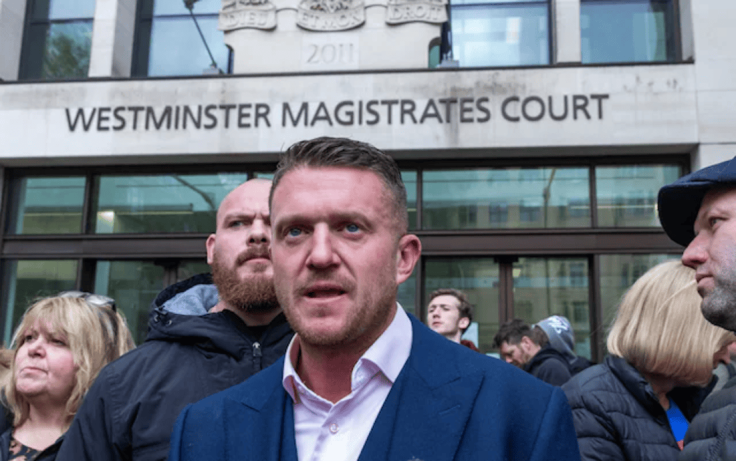Tommy Robinson Cleared of Terror Charges Over Refused Phone Access
Robinson cleared of terrorism charge after refusing phone PIN during border stop under Schedule 7 powers

Tommy Robinson, whose real name is Stephen Yaxley-Lennon, has been cleared of a terrorism-related offence after refusing to unlock his phone for police officers during a border stop in July 2024.
The ruling, delivered on 4 November 2025 at Westminster Magistrates' Court, has reignited a national debate over privacy, free speech, and the limits of counter-terrorism powers in the UK.
The 42-year-old activist, best known as the founder of the English Defence League, had faced prosecution under Schedule 7 of the Terrorism Act 2000, which allows border officers to question and detain individuals without prior suspicion.
Border Stop Under Terrorism Act Powers
Robinson, 42, was stopped by police at the Channel Tunnel terminal in Folkestone while driving a silver Bentley Bentayga SUV en route to Benidorm, Spain. Officers reportedly became suspicious due to his 'vague replies' about his travel plans and the presence of thousands of pounds in cash in the vehicle. Under Schedule 7 of the Terrorism Act 2000, the police demanded access to his iPhone, which he refused to unlock.
Schedule 7 grants the police the authority to stop, question, and detain individuals at UK ports and borders without prior suspicion, to determine potential involvement in terrorism. Refusal to comply with requests for information, including access to devices, can result in criminal charges.
Court Ruling and Judge's Remarks

During the two-day trial, prosecutors argued that Robinson's refusal constituted a breach of counter-terrorism legislation. However, District Judge Sam Goozee ruled that Robinson was not guilty of the offence, stating that the evidence did not support a reasonable belief that Robinson was involved in terrorism.
'I cannot put out of my mind that it was actually what you stood for and your political beliefs that acted for the principle reason for this stop,' Judge Goozee said in his ruling.
The judge's comments raised questions about the role of political bias in the application of counter-terrorism powers, particularly in cases involving high-profile or controversial figures.
Reaction and Defence Funding
Following the verdict, Robinson expressed gratitude to billionaire Elon Musk, claiming that Musk had funded his legal defence. In his post-trial remarks, Robinson expressed gratitude to Elon Musk, stating that the billionaire had supported his fight for free speech and assisted him in challenging the case.
Robinson, a prominent anti-Islam and anti-immigration activist, has long been a divisive figure in British politics. He previously led the English Defence League and has faced multiple legal challenges over the years, including convictions for contempt of court and public order offences.
Legal Implications and Civil Liberties Debate
The case has drawn attention to the use of Schedule 7 powers and their implications for privacy and civil liberties. Critics argue that the legislation allows for disproportionate intrusions into personal data without sufficient safeguards, while supporters maintain that it is a necessary tool for national security.
Civil liberties organisations have previously raised concerns about the lack of judicial oversight and the potential for abuse of Schedule 7 powers. Robinson's acquittal may prompt renewed scrutiny of how these powers are applied and whether reforms are needed to ensure fairness and transparency.
The case highlights the tension between security enforcement and individual rights in an era of heightened digital surveillance.
Reaction from Officials and the Public
Reactions to the verdict have been mixed. Supporters of Robinson hailed the decision as a victory for free speech and personal privacy, while critics warned that it could undermine efforts to combat terrorism. The Home Office has not issued a formal statement on the ruling, but legal experts suggest it may influence future guidance on the use of Schedule 7 powers.
The incident also highlights the challenges faced by law enforcement in striking a balance between suspicion and evidence, particularly when dealing with individuals who are politically charged. As noted by The Independent, the case may serve as a precedent for future disputes over digital access and counter-terrorism enforcement.
Tommy Robinson's acquittal on terrorism-related charges marks a significant moment in the ongoing debate over privacy, policing, and political bias in the UK. While the court found no grounds to convict him under existing legislation, the case raises broader questions about the limits of state power and the protection of civil liberties in an increasingly digital world.
Conclusion
Tommy Robinson's acquittal marks a pivotal moment in the ongoing debate over privacy, policing, and political bias in Britain.
While the court found no basis for terrorism charges, the case highlights how digital privacy rights and state power increasingly collide — raising crucial questions about where the balance should lie in modern law enforcement.
© Copyright IBTimes 2025. All rights reserved.



















